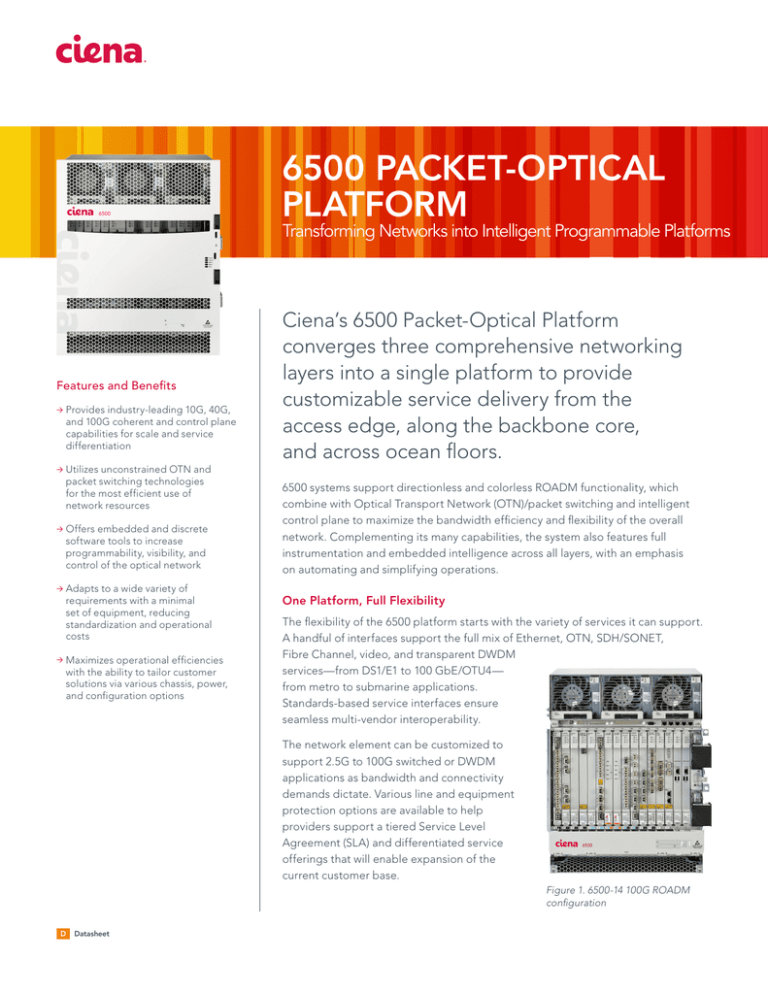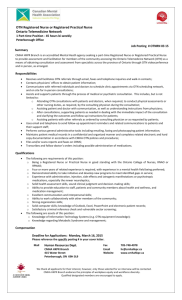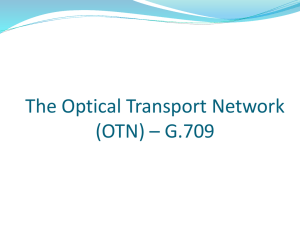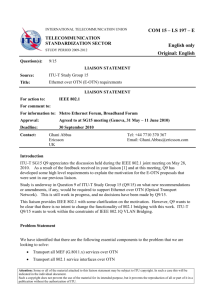
6500 PACKET-OPTICAL
PLATFORM
Transforming Networks into Intelligent Programmable Platforms
Features and Benefits
>
rovides industry-leading 10G, 40G,
P
and 100G coherent and control plane
capabilities for scale and service
differentiation
>
tilizes unconstrained OTN and
U
packet switching technologies
for the most efficient use of
network resources
>
ffers embedded and discrete
O
software tools to increase
programmability, visibility, and
control of the optical network
>
dapts to a wide variety of
A
requirements with a minimal
set of equipment, reducing
standardization and operational
costs
>
aximizes operational efficiencies
M
with the ability to tailor customer
solutions via various chassis, power,
and configuration options
Ciena’s 6500 Packet-Optical Platform
converges three comprehensive networking
layers into a single platform to provide
customizable service delivery from the
access edge, along the backbone core,
and across ocean floors.
6500 systems support directionless and colorless ROADM functionality, which
combine with Optical Transport Network (OTN)/packet switching and intelligent
control plane to maximize the bandwidth efficiency and flexibility of the overall
network. Complementing its many capabilities, the system also features full
instrumentation and embedded intelligence across all layers, with an emphasis
on automating and simplifying operations.
One Platform, Full Flexibility
The flexibility of the 6500 platform starts with the variety of services it can support.
A handful of interfaces support the full mix of Ethernet, OTN, SDH/SONET,
Fibre Channel, video, and transparent DWDM
services—from DS1/E1 to 100 GbE/OTU4—
from metro to submarine applications.
Standards-based service interfaces ensure
seamless multi-vendor interoperability.
The network element can be customized to
support 2.5G to 100G switched or DWDM
applications as bandwidth and connectivity
demands dictate. Various line and equipment
protection options are available to help
providers support a tiered Service Level
Agreement (SLA) and differentiated service
offerings that will enable expansion of the
current customer base.
Figure 1. 6500-14 100G ROADM
configuration
D
Datasheet
Four chassis form factors—6500-2, 6500-7, 6500-14, and
6500-32—are available, with the smaller variants offering both
AC and DC power options. This flexibility results in costoptimized configurations to best match specific site capacity,
space, and power requirements. One software load, one
management system, and re-usable cards across the various
shelves reduce standardization cycles and sparing expenses
and simplify network operations. Along with the ability to
tailor the customer offering, the 6500 comes with proven
five-9s (99.999%) reliability, ensuring the ability to meet the
strictest customer requirements.
Figure 2. 6500-2 amplifier configuration
Programmable Optical Layer
WaveLogic Photonics is Ciena’s fully instrumented, intelligent
photonic system composed of WaveLogic coherent optics
and flexible line elements that combine with embedded and
discrete software tools to offer better automation, control,
and visibility to the optical network.
An important factor influencing business success is the ability
to photonically interconnect sites quickly and economically,
simplify network operations, and reduce costs, power, and
latency associated with regenerators. The 6500 offers the full
range of photonic architectures in one platform, from passive
filters for simple metro service extensions to directionless,
colorless, and flexible grid ROADMs for the power to send
any service anywhere in the network, dynamically.
For more meshed and complex configurations, the WSSbased Reconfigurable Add-Drop Multiplexer (ROADM)
architecture offers full reconfiguration flexibility and simpler
operations. Advanced software capabilities applied to
ROADMs create the fully agile, end-to-end transport network.
A full range of WSS cards and filters provides optimized
performance and cost for varying degree branching sites,
with software features focused on simplifying operations
of a mesh network.
A unique benefit of Ciena’s WaveLogic Photonics is the
support of PinPoint Advanced Fiber Analytics leveraging
integrated Optical Time Domain Reflectometer (OTDR)
capabilities directly into next-generation Raman and EDFA
amplifiers. Operators can use this powerful tool to identify
and localize high connector losses or reflections and ensure
their fiber plant is conditioned for optimal performance.
In particular, integrated OTDR eliminates the pain points
of previous Raman deployments by providing simplified,
controlled turn-up and fast, precise pinpoint of faults.
Finally, contrary to other ‘boxed-in’ vendor solutions, 6500’s
advanced monitoring and software control features allow
for an elegant expansion of the network. Operators are able
to expand connectivity to additional sites with in-service
ROADM additions and channel add/deletions as needed.
Ensuring investment protection, the 6500 network can evolve
to support directionless, colorless, and gridless architectures
when appropriate economics are met for these new
configurations.
Smarter, High-capacity Coherent Technology
An important benefit of the 6500 is that the same platform
can be tailored to cost-effectively address applications from
2.5G to 100G DWDM and beyond. It also provides an elegant
evolution path from 2.5G to 400 Gb/s, leveraging existing
infrastructure investments.
As the pioneer of coherent optical technology, Ciena offers
a comprehensive 40G/100G portfolio with hardware tailored
to address metro, regional, long-haul, and submarine
applications.
Figure 3. 6500-7 E-Suite ROADM configuration
For smaller, simpler network configurations, passive photonics
can be used for lowest capital expenditures. This architecture
supports point-to-point, hubbed ring, multi-degree branching,
and channel stitching. 6500 passive photonics support inventory
and equipment management for full network visibility.
2
In addition to enabling new high-speed services, improving
spectral efficiency and delaying new build-outs, Ciena’s
coherent 40G and 100G solutions operate seamlessly
alongside 10G wavelengths, maximizing the traffic-carrying
capacity of the network. The strong performance of
WaveLogic solutions translates to increased reach, with
fewer regenerators in long-haul applications, as well as
increased tolerance to cascaded ROADMs, which are
prevalent in metro networks.
Field-proven DSP algorithms provide electronic dispersion
compensation to eliminate fixed compensators and their
associated amplifiers in the network. As a result, Ciena’s
coherent solutions provide a more flexible and simpler
network design with the ability to operate over mixed
as well as challenged (high-PMD) fiber environments,
even at 100 Gb/s and higher rates.
WaveLogic 3, the latest generation of Ciena’s family of
coherent optical processors, is the industry’s first softwareprogrammable coherent technology that scales from 100G
to 400G. Through the use of innovative technologies such as
soft-decision Forward Error Correction (FEC) and transmitter
DSP-based programmable modulation, WaveLogic 3 provides
the following additional benefits:
>
nables broader, more economical deployment of 100G
E
across long-haul terrestrial and submarine global networks
with fewer regenerators
>
oubles traffic-carrying capacity to 200 Gb/s per
D
50GHz channel
>
Can be optimized for low-latency applications
Beyond reducing transport costs, WaveLogic 3-based
transceivers can be programmed to quickly respond
and adapt to changing requirements for capacity, reach,
and latency. This programmability makes the optical layer
more intelligent and responsive to application needs,
an increasingly critical requirement in today’s dynamic,
cloud-centric networks.
Packet and OTN Efficiencies
The 6500 offers integrated OTN and packet switching, for the
most efficient utilization of network resources with the ability
to scale to the highest-speed service.
A handful of 6500 OTN interfaces support a wide range of
protocols, allowing for rapid response to service requests and
faster time to revenue, even in an unpredictable environment.
Sub-wavelength grooming ensures the most efficient
bandwidth utilization and scaling of the network.
OTN switching on the 6500 allows for transparent transport
of all native services, along with end-to-end management
of these services, all over a single converged network.
6500 also provides Tandem Connection Monitoring (TCM)
for improved service assurance, giving service providers a
better service fault correlation and troubleshooting capability
when handling third-party traffic.
3
Figure 4. 6500-32 Packet/OTN switched configuration
From a packet-switching perspective, 6500 supports several
E-Suite modules, a set of product offerings specializing in packet
switching across Ciena’s solutions portfolio. All E-Suite modules
leverage Ciena’s Service Aware OS (SAOS), which is available
across the company’s Packet Networking portfolio and deployed
on more than 400,000 platforms worldwide. This common
technology implementation, shared across different devices,
allows for rich functionality implementation and maximum
operational efficiencies through equipment interoperability.
Ciena’s 6500 supports both muxponder- and central fabricbased packet and OTN switching solutions; the configuration
can be cost-optimized for specific service connectivity
requirements. Muxponder-based solutions are best suited for
predictable point-to-point connectivity or when the DWDM
line system is being used for simple interconnection of switch
or router devices. Central fabric-based switching is best
suited for architectures requiring any-to-any connectivity
flexibility. Ciena offers network planning and modeling
services to help operators determine the optimal
configurations for different network scenarios.
Advantages of Ciena’s packet/OTN switched solutions
include:
>
ustomized configurations based on connectivity
C
requirements
>
nrestricted hybrid packet/OTN central switching, with
U
the ability to tune for packet and/or OTN in any ratio
>
he ability to double Ethernet or OTN switching capacity
T
on muxponders via backplane connectivity and the simple
addition of a second module
>
lexible protection options for all hardware options,
F
enabling a tiered SLA offering
Integrated Photonic and OTN Control Plane
Intelligence
A distributed control plane can be an important component
of software-defined networks, enabling a programmable
network foundation that can support changing service
requirements and the bandwidth-on-demand type of
services becoming prevalent with cloud and software-defined
networks.
Ciena’s OneConnect control plane allows the transport
network to automate and distribute many functions formerly
performed through a combination of centralized
management systems and manual processes. In particular,
OneConnect provides the following advantages:
>
ses real-time network topology to provide accurate and
U
automated inventory of equipment and bandwidth
resources
>
ses signaling to provide accelerated service provisioning
U
and faster turn-up
>
ffers tunable SLAs for revenue growth via flexible
O
protection and restoration options
Operators can leverage both Photonic and OTN OneConnect
control planes to increase network availability at lower cost
and guarantee strict customer SLAs with less deployed
equipment. SLAs can range from unprotected to 50ms
protection against any number of failures, and everything in
between. For unprotected services, Photonic OneConnect
ensures Mean Time To Repair (MTTR) guarantees can be met
at little incremental cost.
Another important benefit of OneConnect is it facilitates
wavelength re-grooming, enabling operators to perform
proactive network maintenance in a condensed maintenance
window, with fewer truck rolls. Wavelength re-grooming can
also be used to reroute wavelengths onto shorter, more
optimized paths to reduce regenerator ports and service
latency and rebalance wavelengths to extend the life of the
existing network.
Ciena was among the first to deploy control plane in DWDM
systems and optical cross-connects. The innovative control
plane functionality—hardened with over 15 years of global
field experience and scaling to networks of 1,000 nodes—
4
places Ciena well ahead of the competition for robust and
reliable optical control plane software.
Full Network, Multi-layer Visibility and Optimization
with OneControl and OnePlanner
Ciena’s OneControl Unified Management System offers
comprehensive network and service management for
end-to-end Ciena networks. Through a unified GUI and
common management model, Network Operations Center
(NOC) operators can rapidly deploy new service offerings that
cut across domains (access, metro, core, and subsea) and
coordinate across network protocol layers (photonic,
transport, and packet) to ensure efficient use of critical
network assets and bandwidth optimization.
This efficiency provides comprehensive management and
control, from the access customer hand-off points through
the metro, into the intelligent core, and across subsea networks.
The OneControl GUI allows NOC personnel to create and
activate end-to-end services at the optical layer, including
OTN/SONET/SDH and Layer 2 services such as E-LAN/E-Line.
Once enabled, OneControl provides complete visualization
of the entire end-to-end service with multi-layer correlation,
facilitating proactive root-cause analysis and troubleshooting.
Ciena’s OnePlanner Unified Design System is an advanced,
multi-layer network design and optimization tool that
leverages Ciena’s extensive background in Layer 1 control
plane planning and simulation, photonic system design,
advanced algorithm research, and GUI development into
a comprehensive and easy-to-use platform. OnePlanner
correlates data from different network layers, allowing the
network planner to easily see the association between
services, facilities, and equipment.
Summary
Deployed by more than 400 operators, the 6500 underpins
service provider, research and education, government, and
enterprise networks around the globe. Its popularity hinges
on several key factors:
>
It can be tailored for an economic fit into a variety
of applications
>
It very efficiently delivers a wide range of services
leveraging packet and/or OTN switching
>
It practically scales to elegantly handle step increases
in capacity over existing infrastructure
In short, with the 6500, operators are able to drive network
transformation without restrictions or compromise, with
room to grow.
Technical Information
Physical Dimensions
Transponders/Muxponders
6500-2:
2U 89 mm (H) x 443.2 mm (W) x 281 mm (D)
2U 3.5 in. (H) x 17.5 in. (W) x 11.1 in. (D)
6500-7:
6U 267 mm (H) x 440.5 mm (W) x 281 mm (D)
6U 10.5 in. (H) x 17.3 in. (W) x 11.1 in. (D)
6500-14:
13U 577.1 mm (H) x 440.5 mm (W) x 277.5 mm (D)
13U 22.7 in. (H) x 17.3 in. (W) x 10.9 in. (D)
6500-32:
22U 977 mm (H) x 498.0 mm (W) x 277.5 mm (D)
22U 38.5 in. (H) x 19.6 in. (W) x 277.5 mm (D)
Coherent 100G line cards: metro, regional,
long haul, ultra long haul, enhanced PMD,
submarine, colorless
Coherent 100G client cards: 10x10GE, 10x10G
multi-rate, 100GbE/OTU4 client
Coherent 40G line cards: metro, regional,
long haul, ultra long haul, enhanced PMD,
submarine, colorless
Coherent 40G client cards: 4x10G multi-rate,
40G multi-rate
10G: 4x10G multi-rate OTR
Ethernet: 200G eMOTR, 30G L2 MOTR
OTN modules: 8-port OTN Flex MOTR (10G),
1+8 port OTN Flex MOTR (20G)
SONET/SDH 10G ADM-on-a-blade: SuperMux
Capacity
SONET/SDH: 640 Gb/s
Packet/OTN: 3.2 Tb/s
System: 96 Tb/s
WDM: 2.5G/10G/40G/100G DWDM,
2.5G CWDM
Wavelength support: 96 wavelengths in
C-band, full band tunable optics
SONET/SDH XC: 20G to 80G low order,
80G to 640G high order
Packet/OTN XC: 600G to 3.2T
Photonics
2-Fiber BLSR/MS-SPRing
4-Fiber BLSR/MS-SPRing/HERS
UPSR/SNCP
ASNCP
Mesh restorable control plane connections at
L0 and L1
RPR layer 2 protection
G.8032 ERP
Common Equipment
Full common equipment redundancy
Field-replaceable units
-48Vdc input voltage range:
-40Vdc to -75Vdc
24Vdc input voltage range: +20Vdc to +30Vdc
AC input voltage range: 90Vac to 264Vac
Packet/OTN switched modules
Environmental Characteristics
10x10G Packet/OTN
100G DWDM, OTU4
40G DWDM, OTU3
16x2.7G OTN
Normal Operating Temperature: +5°C to
+40°C (+41° F to +104° F)
Short Term Operating Temperature: -5° C to
+55° C (+23° F to +131° F) for 6500-2/7/14;
-5° C to +50° C (+23° F to +122° F) for
6500-32
Normal operating humidity: 5% to 85% RH
Earthquake/seismic: Zone 4
SONET/SDH switched modules
Ethernet: L2 service switch, PDH Gateway, EPL
Electrical: E1, DS1, DS3, EC-1, E3
Optical: OC-3/STM-1 through OC-192/STM-64
Full suite of passive filters, 50GHz, 100GHz,
flexible grid ROADMs, EDFAs, smart
Raman, and Channel Mux/Demux options
Distributed Control Plane
Services
Configurations
Ethernet: 10M, 100M, GbE, 40GbE, 100GbE
OTN: OTU0 to OTU4
FC100 to FC1200
SONET/SDH: OC-3/STM-1 through
OC-768/STM-256
Electrical: DS1, E1, DS3, E3, STM-1e
ESCON
DVB-ASI
Unprotected
1+1/MSP linear
1+1 OTN line-side
1+1 LAG
1+1 Enhanced Trunk Switch (ETS)
1+1 Transponder Protection Tray
1+1 Optical Protection switch (incl. fast
coherent switching)
Photonic, OTN, SONET/SDH
Ciena may from time to time make changes to the products or
specifications contained herein without notice. Copyright © 2014
Ciena® Corporation. All rights reserved. DS254 3.2014
Networks that change
the way you compete.






